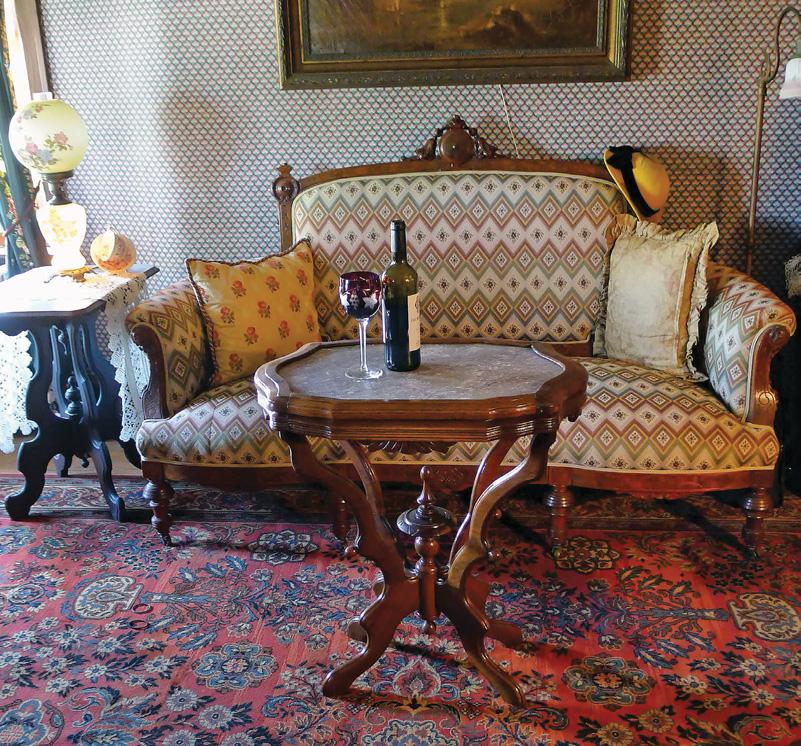Rescuing Old Furniture By Refinishing
Old House Journal
|July - August 2024
Sometimes the finish is just too far gone and the old piece demands a refresh to make it attractive and usable. Here's one success story.

We all have hand-me-down and garage-sale pieces that don't warrant a curatorial approach.
This article references middle-of-the-road furnishings without provenance and with badly damaged finishes. As a historicpreservation specialist, I offer this caveat: a lot of 18th- through early-20th-century pieces keep their value only if the finish is original. Furthermore, some finishes that appear badly damaged can be brought back without removal. Before altering any finishes, check with an antiques appraiser whom you trust.
You may come across a decent find that's affordable precisely because the finish is a goner. Depending on the finish and the history of the piece, the finish may have been damaged by water, by ultraviolet light, acid or another spill, nicotine, or pollution.
 Some finishes tended to polymerize over time, contributing to darkening and alligatoring. Your find may have spent too many years next to the fireplace or sitting in direct sunlight. Or a barn.
Some finishes tended to polymerize over time, contributing to darkening and alligatoring. Your find may have spent too many years next to the fireplace or sitting in direct sunlight. Or a barn.Recently I tackled such a project. The small parlor side table, a rather generic 19th-century piece, was relatively intact save for a loose joint or two. Its finish, however, contributed nothing.
Cette histoire est tirée de l'édition July - August 2024 de Old House Journal.
Abonnez-vous à Magzter GOLD pour accéder à des milliers d'histoires premium sélectionnées et à plus de 9 000 magazines et journaux.
Déjà abonné ? Se connecter
PLUS D'HISTOIRES DE Old House Journal

Old House Journal
designing built-in living spaces
I want an alcove just for me. Kind of like a hideout separate from the commotion in the rest of the house from which to read, write, nap, or just daydream. I want to be aware of the action in the house but be able to turn my shoulder politely and be by myself. So goes the design brief from one of our clients. She's not alone in her desire for personal scale and place-making in home design; this is a common human need.
1 mins
January - February 2026

Old House Journal
ASK OHJ
For the past year or so, the brick surround of my fireplace (below the opening, underneath a stone hearth) has been producing a white-ish dust.
4 mins
January - February 2026

Old House Journal
a bungalow Out West
A restoration prodigy restores a 1915 Arts & Crafts bungalow in Sheridan, Wyoming, and that leads to a successful career.
2 mins
January - February 2026

Old House Journal
Just the way it was
Original elements remain in this 1914 Prairie-influenced house: handsome wood and leaded windows, the brick fire-place, wainscot and trim, and even kitchen cabinets. Deftly added upgrades in period mode enhance the exemplary restoration.
2 mins
January - February 2026

Old House Journal
Matching Old Mouldings
There comes a time in the life of every old-house owner when we need to match a section of existing wood moulding.
4 mins
January - February 2026

Old House Journal
Victorian Update
A sophisticated kitchen renovation corrects anachronisms in an 1891 house undergoing restoration.
2 mins
January - February 2026

Old House Journal
NEW INSULATION FOR OLD WALLS
If after insulating the attic, weather-stripping windows, and addressing infiltration, an energy audit recommends upgrading wall insulation, the first step is to find out what's already in there, if anything.
1 mins
January - February 2026

Old House Journal
Finishing Secrets FOR FURNITURE-GRADE TRIM
Whether you're staining a door, built-in cabinetry, or any of the millwork in between, follow these steps for a flawless finish.
5 mins
January - February 2026

Old House Journal
art deco BATHS IN BLACK & WHITE
OWNERS OF A 1926 HOUSE DECIDE TO LOOK BACK TO THE ERA WHEN IT WAS BUILT, EMBRACING BOLD LUXURY.
2 mins
January - February 2026

Old House Journal
English Garden Inspiration
In what was an old Columbus schoolyard, Hoerr Schaudt Landscape Architects introduce a profusion of color and pattern.
2 mins
Winter 2026
Listen
Translate
Change font size

